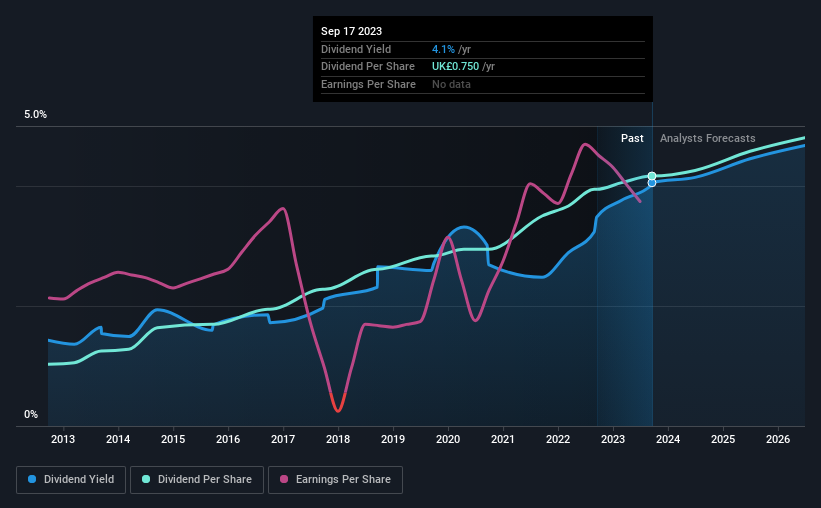Is It Smart To Buy Brooks Macdonald Group plc (LON:BRK) Before It Goes Ex-Dividend?
Readers hoping to buy Brooks Macdonald Group plc (LON:BRK) for its dividend will need to make their move shortly, as the stock is about to trade ex-dividend. The ex-dividend date occurs one day before the record date which is the day on which shareholders need to be on the company's books in order to receive a dividend. The ex-dividend date is of consequence because whenever a stock is bought or sold, the trade takes at least two business day to settle. Thus, you can purchase Brooks Macdonald Group's shares before the 21st of September in order to receive the dividend, which the company will pay on the 3rd of November.
The company's next dividend payment will be UK£0.47 per share, on the back of last year when the company paid a total of UK£0.75 to shareholders. Calculating the last year's worth of payments shows that Brooks Macdonald Group has a trailing yield of 4.1% on the current share price of £18.5. If you buy this business for its dividend, you should have an idea of whether Brooks Macdonald Group's dividend is reliable and sustainable. So we need to investigate whether Brooks Macdonald Group can afford its dividend, and if the dividend could grow.
Check out our latest analysis for Brooks Macdonald Group
Dividends are typically paid out of company income, so if a company pays out more than it earned, its dividend is usually at a higher risk of being cut. Brooks Macdonald Group paid out more than half (65%) of its earnings last year, which is a regular payout ratio for most companies.
Generally speaking, the lower a company's payout ratios, the more resilient its dividend usually is.
Click here to see the company's payout ratio, plus analyst estimates of its future dividends.
Have Earnings And Dividends Been Growing?
Businesses with strong growth prospects usually make the best dividend payers, because it's easier to grow dividends when earnings per share are improving. If earnings fall far enough, the company could be forced to cut its dividend. That's why it's comforting to see Brooks Macdonald Group's earnings have been skyrocketing, up 23% per annum for the past five years.
Another key way to measure a company's dividend prospects is by measuring its historical rate of dividend growth. Brooks Macdonald Group has delivered an average of 15% per year annual increase in its dividend, based on the past 10 years of dividend payments. Both per-share earnings and dividends have both been growing rapidly in recent times, which is great to see.
The Bottom Line
From a dividend perspective, should investors buy or avoid Brooks Macdonald Group? Brooks Macdonald Group has an acceptable payout ratio and its earnings per share have been improving at a decent rate. Brooks Macdonald Group ticks a lot of boxes for us from a dividend perspective, and we think these characteristics should mark the company as deserving of further attention.
So while Brooks Macdonald Group looks good from a dividend perspective, it's always worthwhile being up to date with the risks involved in this stock. Our analysis shows 1 warning sign for Brooks Macdonald Group and you should be aware of it before buying any shares.
A common investing mistake is buying the first interesting stock you see. Here you can find a full list of high-yield dividend stocks.
Have feedback on this article? Concerned about the content? Get in touch with us directly. Alternatively, email editorial-team (at) simplywallst.com.
This article by Simply Wall St is general in nature. We provide commentary based on historical data and analyst forecasts only using an unbiased methodology and our articles are not intended to be financial advice. It does not constitute a recommendation to buy or sell any stock, and does not take account of your objectives, or your financial situation. We aim to bring you long-term focused analysis driven by fundamental data. Note that our analysis may not factor in the latest price-sensitive company announcements or qualitative material. Simply Wall St has no position in any stocks mentioned.

